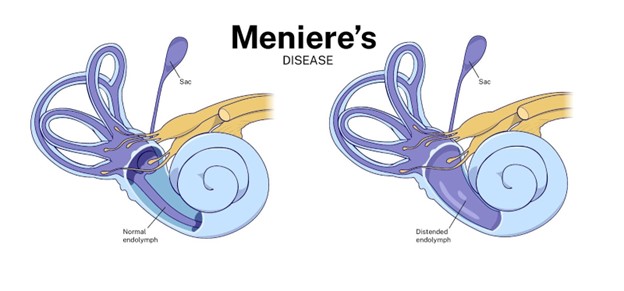A client admitted with an acute exacerbation of Ménière's disease asks the student nurse why he was prescribed diphenhydramine. Which response by the student nurse requires correction by the primary nurse?
"Ménière's disease is caused by an allergic response."
"This medication can help offset the nauseous feeling."
"Anticholinergics will help you rest."
"This medication can help reduce vomiting episodes."
The Correct Answer is A
Choice A Reason: This is incorrect because Ménière's disease is not caused by an allergic response. Ménière's disease is a disorder of the inner ear that causes vertigo, tinnitus, hearing loss, and a feeling of fullness in the ear. The exact cause of Ménière's disease is unknown, but it may be related to fluid imbalance, infection, trauma, or autoimmune reaction.
Choice B Reason: This is correct because diphenhydramine can help offset the nauseous feeling. Diphenhydramine is an antihistamine that blocks histamine receptors in the brain and inner ear, which can reduce nausea and vomiting associated with vertigo.
Choice C Reason: This is correct because anticholinergics will help you rest. Anticholinergics are a class of drugs that block acetylcholine receptors in the brain and body, which can have sedative effects and reduce motion sickness. Diphenhydramine has anticholinergic properties.
Choice D Reason: This is correct because diphenhydramine can help reduce vomiting episodes. As mentioned above, diphenhydramine can reduce nausea and vomiting by blocking histamine receptors in the brain and inner ear.

Nursing Test Bank
Naxlex Comprehensive Predictor Exams
Related Questions
Correct Answer is D
Explanation
Choice A Reason: To administer medications and electrolytes is not the best reply for why the client will need the NG tube, because this is not the primary purpose of the NG tube in this case. The NG tube is mainly used to relieve gastric distension and prevent vomiting and aspiration. Medications and electrolytes can be given through the IV route.
Choice B Reason: To dilate the stomach as a presurgical preparation is not the best reply for why the client will need the NG tube, because this is not a valid indication for the NG tube in this case. The NG tube is mainly used to relieve gastric distension and prevent vomiting and aspiration. Dilation of the stomach is not a goal of presurgical preparation, but rather an adverse effect of gastric obstruction.
Choice C Reason: You will not be able to eat for several days is not the best reply for why the client will need the NG tube, because this is not a complete or accurate explanation of the NG tube in this case. The NG tube is mainly used to relieve gastric distension and prevent vomiting and aspiration. The client will not be able to eat for several days because of the NPO diet, which is necessary to rest the inflamed peritoneum and reduce the risk of complications.
Choice D Reason: To remove secretions and decompress your stomach is the best reply for why the client will need the NG tube, because this is a clear and correct explanation of the NG tube in this case. The NG tube is mainly used to relieve gastric distension and prevent vomiting and aspiration, which are common symptoms of acute peritonitis. By removing secretions and decompressing the stomach, the NG tube can reduce pain, inflammation, and infection in the abdominal cavity.
Correct Answer is D
Explanation
Choice A reason: This is incorrect because administering IV ketorolac is not a priority intervention for a client with cholecystitis. Ketorolac is a nonsteroidal anti-inflammatory drug (NSAID) that can cause gastrointestinal bleeding and kidney damage, which are contraindicated in cholecystitis. The nurse should administer analgesics as prescribed, but only after assessing the pain level and severity.
Choice B reason: This is incorrect because reporting findings to healthcare provider is not a priority intervention for a client with cholecystitis. The nurse should communicate with the healthcare provider about the client's condition and treatment plan, but only after assessing the pain level and other vital signs.
Choice C reason: This is incorrect because offering a high-calorie, high-fat meal is not an intervention for a client with cholecystitis, but a potential trigger. High-fat foods can stimulate the gallbladder to contract and cause more pain and inflammation. The nurse should advise the client to avoid fatty foods and follow a low-fat diet.
Choice D reason: This is the correct answer because assessing the pain level is a priority intervention for a client with cholecystitis. Pain is the most common symptom of cholecystitis and can indicate the severity and complications of the condition. The nurse should assess the pain level using a numeric or descriptive scale, and monitor for changes in location, intensity, and duration.
Whether you are a student looking to ace your exams or a practicing nurse seeking to enhance your expertise , our nursing education contents will empower you with the confidence and competence to make a difference in the lives of patients and become a respected leader in the healthcare field.
Visit Naxlex, invest in your future and unlock endless possibilities with our unparalleled nursing education contents today
Report Wrong Answer on the Current Question
Do you disagree with the answer? If yes, what is your expected answer? Explain.
Kindly be descriptive with the issue you are facing.
